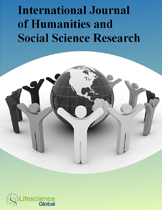ijhssr
|
|
|
Abstract:What should we think of a biographer who admits inability to understand the ideas of the thinker she writes about? Why write a biography of someone not only dead but also proclaimed forgotten (unless one intends to resurrect him, which is not the case)? Why dig up someone’s bones only to showcase his skeleton amidst the closet’s dirty linen? Why confine oneself to the preliminary part of someone’s life –the one preceding his academic biography? Paul de Man’s recent biography by Evelin Barish raises these and more questions and eyebrows. Surprisingly, however, it has elicited a largely positive response in the US. Why were intellectuals like Louis Menand, Peter Brooks, Susan Rubin Suleiman and others so cautious and humble in their lengthy reviews? This text will suggest some possible answers. Keywords: Deconstruction, theory, collaborationism, antisemitism, biography. |
|
|
|
Abstract: The study examined spiritual and religious connections and complexities in rural communities using the indigenous Annang people of Akwa Ibom state as a case study. The research made use of primary data from 150 randomly selected respondents and 8 purposively selected key informants, using questionnaires and interview schedules. Data analysis was both descriptive and inferential. Findings indicate that 94% of the respondents were aged between 21 and 60years, 94% had some form of formal schooling, all respondents were Christians, 61.3% being married and 92% earned a maximum of NGN50, 000 monthly. 52% of respondents had farming as their primary occupation. Respondents were highly inclined to spirituality with 98.7% of respondents attending religious functions at least once a week and a further 62.7% relying on fate, miracles and protection from charms and amulets. The multiple regression results showed that there was no significant relationship between selected sociological factors and respondent’s inclination to spirituality, while the T-test analysis showed that there was no difference in the inclination to spirituality between men and women. The study recommends that formal education with focus on the enlightenment, re-orientation, and counselling of individuals be effectively initiated to reduce the levels of inclination to spirituality. This will ensure that local level decision making is objective and based on facts. Keywords: Spiritual connections, rural communities, Annangs, Nigeria. |
|
|
|
Abstract: Although the minimum wage is one of the most commonly researched subjects, its treatment by economists has remained inadequate and led to misconceptions regarding its role in modern society. This philosophical piece offers a rebuttal to the conventional merit-based objection to the minimum wage and puts forward alternative lenses through which the moral appeal of the minimum wage should be (re-)evaluated. We argue that our evolutionary heritage can help us demystify the persistent popular support behind the minimum wage laws. In our framework, the minimum wage laws will be viewed as instrumental in meeting the “basic needs” of those who are offering productive contributions. The approach taken in this paper will supplement and modify old institutionalist framework and equip it with proper moral foundations. Keywords: Minimum wage, morality, evolution, institutionalism. |
|
|
|
Abstract: In this study, it is aimed to determine whether there is correlation between the school bullying and the experiences of adolescents in their close relationships. The participants of this study consisted of children from 9th,10th,11th,12th grades of three different high schools. In this research, Student Relationships Attitude Scale and Experiences in Close Relationships Inventory were used as data collection tools. Results of the study revealed significant positive relationships between the bullying personality attitude and attachment avoidance and attachment worry dimensions of the Experiences in Close Relationships Inventory. Significant relationships were found between confident attitude and attachment avoidance dimension of the Experiences in Close Relationships Inventory. Keywords: Adolescent, close relationships, school bullying. |
|
|
|
Abstract: This article examines what is called the ‘caring organization’ out of the work of French philosopher Jean-Luc Nancy. Starting from two tales from Kafka and Borges, it analyzes Nancy’s concept of community and singularity and their potential relevance for the area of social sciences. Thinking an organization from the perspective of singularity means that we no longer think in terms of an unchangeable essence. Nancy’s notion of the singular goes the other way round: organizations are able to function because they differ from themselves and change all the time. An organization is but its components with their singular traits at every moment and these traits produce a singularized and thus necessarily temporary collective. As long as we start from identity as a substantial given, an unfruitful opposition is at work: the collective, the organization, is seen as the enemy of the subject and vice versa. Nancy’s notion of singularity on the contrary, does not start from an opposition of two identities but from identities differing from themselves because they are understood as singular, changing entities; their singular characteristics potentially modify the whole as such. Keywords: Jean-Luc Nancy, organization, identity, singularity. |




